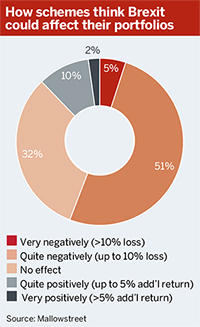Negative portfolio returns and prolonged unpredictability are the top concerns potential Brexit raises for pension stakeholders according to a new survey by pensions platform Mallowstreet. However, pensions insiders said these risks should already have started being addressed.
The survey collated the responses of 120 industry figures. Fifty-six per cent of respondents said Brexit would negatively impact pension schemes, and 70 per cent said it would weaken the position of corporate sponsors.
Market and exchange rate volatility, and political uncertainty, are the three main investment concerns, the survey found.
Review risk tolerance
Mette Hansen, vice-president of investment consulting at Redington, said the referendum offers schemes an opportunity to review their risk tolerance and risk budget, particularly citing collateral and liquidity risk, as well as currency exposure.

She explained: “No scheme can afford not to take risks, but each scheme should know and monitor them,” adding that less obvious risks also lie in derivatives and investment banking, areas heavily impacted by new, more stringent regulations.
Despite concerns about employer strength and covenant, schemes should not make assumptions about forthcoming cash increases from sponsors in a volatile environment.
“Build recovery plans without assumptions about cash that hasn’t been guaranteed,” she advised.
Hansen said the benefits of scenario-testing for schemes were limited, as many of the risks have already been priced into the markets. Trustees should therefore use existing risk management frameworks to test their schemes.
“Brexit [would be] essentially no different to other market events,” she said.
Schemes should work with the premise that there will be instability
David Fairs, KPMG
Assume instability
Many of the top concerns respondents cited are in fact long standing, and should already be being managed, said David Fairs, partner at consultancy KPMG. While exchange-rate volatility should be on the radar, there has already been a fall in sterling, he pointed out.
Moreover, while political uncertainty is a noteworthy risk, recent changes to the pensions framework and tax legislation have been creating disruption for a long time.
While the referendum will cause some volatility, Fairs stressed that “opportunities can appear as well as disappear” in its aftermath. For example, schemes with many overseas equity holdings could end up with a pension surplus.
Most importantly, he advised schemes against “knee-jerk reactions”, such as changing long-term investment strategies in the run-up to June 23, as they are long-term investment vehicles and should already be accounting for short-term shocks.
“Schemes should consider hedging, but they should already have been doing so,” he said. “Schemes should work with the premise that there will be instability.”
Long-term game
Survey respondents also expressed concern about the performance of asset classes such as UK equities and UK property following a leave result, and their effect on portfolios.
Steve Delo, chief executive at Pan Trustees, said by virtue of the fact they are invested in global markets, pension schemes could not help but be affected by Brexit.
However, he remarked that “it is impossible to generalise; this is uncharted territory”.
Even if UK equities are negatively impacted by a leave vote, this may not be such a risk for schemes, Delo said, as most are no longer heavily invested in UK equities.
Schemes should ensure their long-term strategy is driven by the interest-rate outlook.
“Keep an open mind, and remember that this is a long-term game,” said Delo.
Good management, not Brexit
Vassos Vassou, trustee representative at Dalriada Trustees, emphasised that investment planning should be strategic, not tactical.
“Schemes should have a process in place to determine their investment strategy,” and should go through with this process regardless of the referendum result.
“Investment strategy should still be about good management, not Brexit,” he commented.
Vassou said trustees were right to be aware of employer covenant, saying they should understand how their sponsor “operates and does business”, and should base their schemes’ funding arrangements on covenant position in consultation with the employer.

























